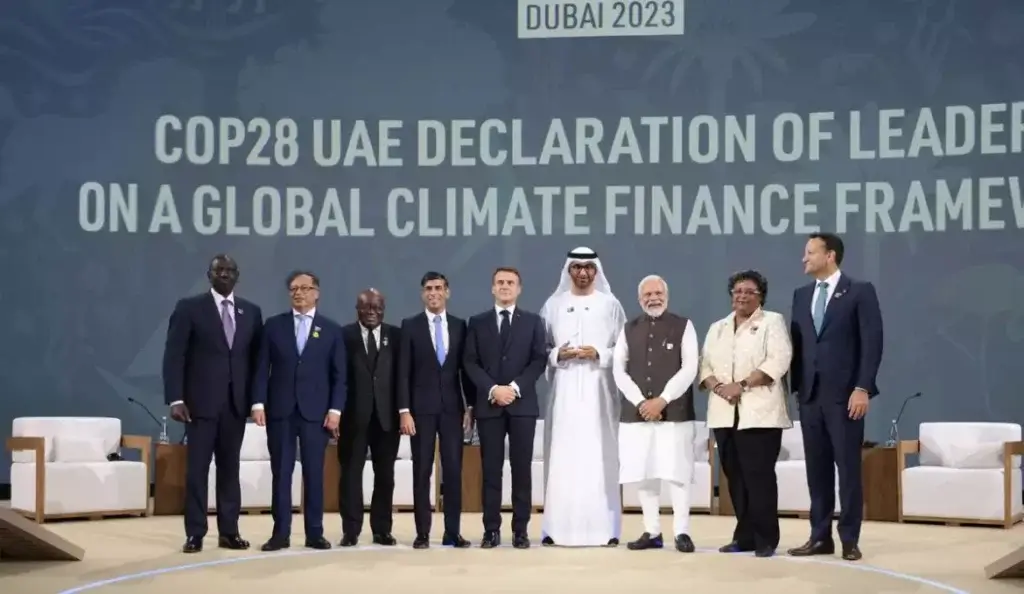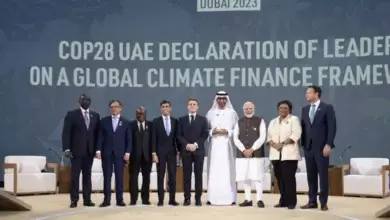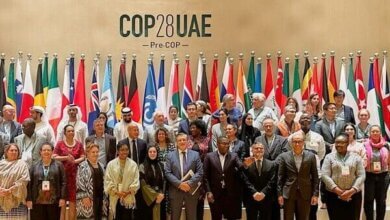The UNFCCC COP 28 : the Miracle of the Eleventh Hour?

- Historic Agreement on Fossil Fuels at UNFCCC COP 28
- The UNFCCC COP 28 “UAE Consensus”: Despite Conflicting Interests
- The UAE Consensus: UNFCCC COP 28, a Milestone or a Missed Opportunity?
- Bridging the Gap at UNFCCC COP 28: Financial and Technological Challenges
- The Road Ahead: Recommendations and Actions
- Conclusion
- References
The UNFCCC COP 28 summit, a pivotal event in global climate diplomacy held in Dubai, concluded today with significant outcomes and pronounced aspirations [1]. Our analysis delves into the intricacies of the UNFCCC COP 28 agreement, evaluates its implications, and explores the path ahead in the relentless battle against climate change.
Historic Agreement on Fossil Fuels at UNFCCC COP 28
At the UNFCCC COP 28 climate summit, nearly 200 countries reached a significant agreement [1] aimed at addressing the global climate crisis. The core objective of the deal was to encourage nations to transition away from fossil fuels, marking a pivotal moment in the fight against climate change.
While the UNFCCC COP 28 agreement did not explicitly commit to a phase-out of fossil fuels, it called for a just and equitable transition to achieve net-zero emissions by 2050, aligning with scientific recommendations. This approach was met with a mix of support and criticism.
UNFCCC COP 28 President Sultan Al Jaber celebrated the deal as a historic step toward accelerating climate action and keeping global temperature rise below 1.5°C compared to preindustrial levels.
However, the Alliance of Small Island States, representing 39 countries, expressed dissatisfaction, pointing out what they perceived as “litany of loopholes” within the agreement [2]. They also highlighted the absence of a clear financing mechanism to aid developing countries in transitioning away from fossil fuels.
The UNFCCC COP 28 agreement also set ambitious targets, such as tripling global renewable energy capacity by 2030 and emphasizing the necessity of substantial reductions in greenhouse gas emissions.
Despite criticism, the inclusion of the term “fossil fuels” in a Cop outcome for the first time marked a significant symbolic shift. It indicated a growing global recognition of the need to move towards a fossil-free world.
Throughout the negotiations, UNFCCC COP 28 President Al Jaber engaged in extensive diplomacy efforts to address concerns and improve the agreement, particularly after an earlier draft had been widely rejected as insufficient.
The UNFCCC COP 28 “UAE Consensus”: Despite Conflicting Interests
This agreement, though far from perfect, met significant resistance from major oil-producing countries. Saudi Arabia notably tried to erase any references to fossil fuels from the discussion, later shifting its focus to advocate for carbon capture and storage technology—a solution it vocally supports but curiously refrains from investing in significantly. The focus on carbon capture and storage (CCS) and other unproven technologies was seen as a diversion from the real issue – the need to eliminate fossil fuel dependence.
As the leading producer of oil and gas worldwide, China presents a unique dichotomy. On one hand, it is aggressively expanding its coal production; on the other, it’s equally committed to augmenting its renewable energy resources. Concurrently, India’s coal sector seems poised to continue its operations largely unaffected by the recent international agreement. Russia, maintaining a low profile, has reportedly been undermining the progress and is anticipated to further its efforts at next year’s COP summit in Baku, Azerbaijan.
The United States appears to have navigated the negotiations with minimal commitments, pledging just over $20 million. The swift adoption of the deal led to its characterization as the “UAE consensus” by UNFCCC COP 28 president Al Jaber.
The UAE Consensus: UNFCCC COP 28, a Milestone or a Missed Opportunity?
The UNFCCC COP 28’s final plenary brought a collective sense of progress among nations earnestly grappling with the climate crisis. This sentiment is rooted in the belief that the agreement marks the beginning of the end for the fossil fuel era. However, the transition away from coal, oil, and gas is expected to be a gradual process, with developed nations and oil producers not moving at the pace urged by climate scientists.
Yet, the definitive impact of this historic agreement remains in question. Will it be the catalyst for the end of the fossil fuel era, or merely another step towards a potential climate catastrophe remains to be seen? The resolution passed at UNFCCC COP 28, while historic in its call for an implicit phase-out of fossil fuels, is not enforceable and contains numerous loopholes. These gaps, particularly concerning for small island states vulnerable to climate change, may hinder significant reductions in greenhouse gas emissions necessary to limit global warming to 1.5C above pre-industrial levels.
While the mention of fossil fuels in the final stocktake document [3] was seen as a crucial political signal, yet it was criticized for its lack of concrete commitment to phasing them out. Critics highlighted intentionally vague language, which they argue was designed to dilute the agreement’s effectiveness.
Amid these complexities, developing countries are still in dire need of substantial financial support to aid their transition, a challenge that continues to loom large in the global effort to combat climate change.
Bridging the Gap at UNFCCC COP 28: Financial and Technological Challenges
Financial Support for Developing Nations
One of the most pressing issues at UNFCCC COP 28 was the need for financial support for developing countries. These nations, most impacted by climate change, face a critical challenge in transitioning away from fossil fuels. Despite recognizing this need, the summit fell short in providing concrete financial mechanisms or commitments. This omission creates a significant hurdle in the global effort to achieve a sustainable future, especially for countries with limited resources.
Technological Transfer and Implementation
The focus on technologies like Carbon Capture and Storage (CCS) at the summit has been met with skepticism. While CCS has potential, its current status as an unproven and costly technology raises doubts about its scalability and effectiveness in the near term. This reliance on uncertain technologies may divert attention and resources from more practical and immediately viable solutions, such as renewable energy sources. The need for technology transfer – providing developing countries with access to existing, effective green technologies – remains inadequately addressed. This gap hinders the global shift towards renewable energy, which is essential for meeting climate goals.

UNFCCC COP 28 highlighted the urgent need for financial and technological support for developing countries. Addressing these challenges is essential for a fair and effective global response to climate change. Future summits and international agreements must focus on delivering tangible support mechanisms to ensure all nations can contribute to and benefit from a transition to a sustainable future.
The Road Ahead: Recommendations and Actions
To enhance the effectiveness of future climate agreements and build on the foundation set by UNFCCC COP 28, several key actions are recommended:
Clearer Commitments
Future agreements must articulate explicit commitments to phase out fossil fuels. This includes setting specific timelines and measurable targets, ensuring that countries have a clear roadmap to reduce and eventually eliminate their reliance on fossil fuels. These commitments need to be ambitious yet realistic, balancing environmental urgency with economic and social feasibility.
Financial and Technological Support
Developed countries, which historically have contributed more to greenhouse gas emissions, should provide substantial financial aid and technology transfer to support developing nations. This support is crucial for enabling these countries to leapfrog to cleaner technologies, adapt to the impacts of climate change, and participate actively in global mitigation efforts. Financial mechanisms should be transparent, accessible, and aligned with the specific needs of developing countries.
Inclusive Decision-Making
The process of decision-making in future climate negotiations must be inclusive, ensuring that the voices of vulnerable nations and communities are not only heard but also given due weight. This approach should include more significant participation from small island nations, indigenous communities, and countries that are most at risk from climate impacts. By fostering a more inclusive environment, the global community can ensure that climate action is equitable and considers the diverse needs of all stakeholders.
Adopting these recommendations will be crucial in ensuring that future climate agreements are more effective, equitable, and capable of meeting the global challenge of climate change. The path forward requires a concerted effort from all nations, informed by the lessons learned from UNFCCC COP 28.
Conclusion
The UNFCCC COP 28 summit, a significant event in global climate discussions, marked both progress and challenges in the ongoing effort to address climate change. The summit’s landmark agreement to transition away from fossil fuels represents a crucial step forward in global climate action [3, 4].
Key Takeaways from UNFCCC COP 28
- The UAE Consensus, while a historic achievement, faced criticism for its vague language and reliance on unproven technologies, such as CCS. These criticisms underscore the need for more concrete, actionable commitments in future climate agreements.
- Financial and technological support for developing nations emerged as a crucial area needing more attention. The summit’s lack of detailed mechanisms for financial aid and technology transfer highlighted a significant gap in global climate efforts, especially for nations most affected by climate change.
- The call for inclusive decision-making in future negotiations is vital. Ensuring that all voices, particularly those of vulnerable nations and communities, are heard and addressed is essential for equitable and effective climate action.
The Role of Multilateralism and Inclusivity
The success of UNFCCC COP 28’s outcomes hinges on the strength of multilateral cooperation and inclusive decision-making processes. Ensuring that all nations, particularly those most vulnerable to climate change, have a voice in shaping climate action is crucial for the legitimacy and effectiveness of global climate policies.
Looking Ahead
As the world moves forward from UNFCCC COP 28, there is a clear need for more ambitious commitments, substantial financial and technological support for developing countries, and inclusive decision-making processes. These steps are not just necessary for the success of future climate summits but are essential for the global community to effectively combat climate change and achieve sustainable development goals.
The road ahead is challenging, but UNFCCC COP 28 has set a new precedent for international climate diplomacy. The collective efforts and lessons learned from this summit should guide future actions, ensuring that the world moves towards a more sustainable, equitable, and climate-resilient future.
References
- UNFCCC COP 28 President_Remarks_Closing Plenary_13 Dec 2023
- UNFCCC COP 28 Closing Plenary: AOSIS Statement on GST Decision
- First Global Stocktake Dec 13, 2023





